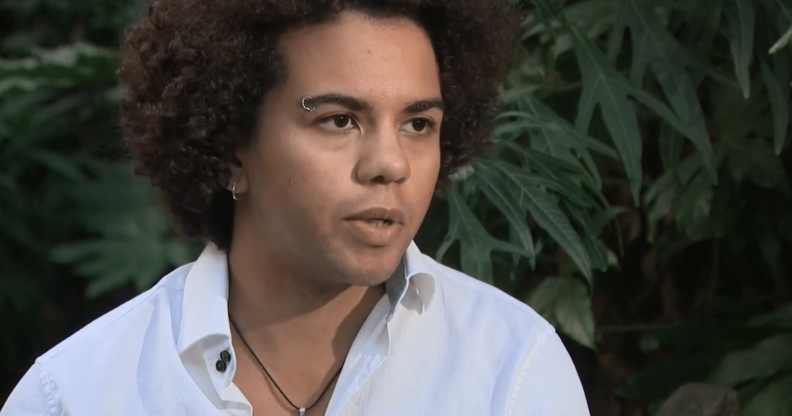Trans kids think ‘the world hates them’ thanks to High Court’s cruel puberty blockers ruling

Keira Bell brought legal action against the Tavistock and Portman NHS Trust. (YouTube/Sky News)
Trans youth are internalising a message that “the world hates them” as a result of the High Court’s puberty blockers decision in the Bell v Tavistock case last year, according to the CEO of a leading trans charity.
The High Court ruled in December 2020 that transgender under 16s would have to be able to understand the nature of hormone replacement therapy (HRT) and gender affirming surgery in order to be prescribed puberty blocking medication. The court ruled that it is “highly unlikely” under 13s would be competent to give consent, and said it is “doubtful” children aged 14 and 15 would be able to understand “the long term risks and consequences”.
The judicial review was brought by Keira Bell, 23, who took puberty blockers aged 16 and later regretted that decision, and Mrs A, a mother who wanted to prevent her trans teenager from taking puberty blockers. The ruling means that trans under 16s in England and Wales cannot be prescribed puberty blockers without the approval of a court.
Speaking at an academic conference on the medical and legal consequences of the ruling on Wednesday (3 March), Dr Jay Stewart, CEO and co-founder of trans charity Gendered Intelligence, said the decision is already having an impact on the mental wellbeing of trans youth.
Young trans people who work with Gendered Intelligence have spoken of feeling a “lack of control” over their lives as a result of the judgement, Stewart said.
“Young people have described it as offensive that they do not have appropriate autonomy over their bodies and their choices,” he said.
He added: “We’ve got a situation where there are more strangers, not less, making decisions about what’s in the best interests of the young person, and there’s a fear that the wishes and needs of the young person are not being put front and centre.”
Gendered Intelligence has been working with trans youth to help them feel that “they do have some element of control over their lives”, Stewart said.
“I think there needs to be some acknowledgement that the medico-legal system could be causing harm with some of the decisions that have happened,” he said.
He warned that there is a real risk trans youth will “internalise” a harmful message sent by the High Court’s ruling.
“Our young people have described how the judgement has made them feel that the world hates them, and the danger is that this message could get internalised as, ‘there’s something wrong with me and I deserve to be punished,'” he said.
Stewart noted that shame and internalised hatred can have “lifelong” repercussions for trans youth.
People needs to “unpack” why society is so unwilling to grant trans people the autonomy to make their own decisions, Stewart said. He argued that there is nothing to fear by granting trans people the right to explore their identities.
Puberty blockers ruling is ‘potentially discriminatory’ to young people
Stewart was joined at the University of Bristol conference by a number of other academics who discussed the legal and medical implications of the judgement.
Ruth Fletcher, a senior lecturer in medical law at Queen Mary University of London, outlined five ways in which the High Court’s judgement in Bell v Tavistock is “problematic”.
She said the judgement “pushes in a direction that goes against – or troubles, at least – directions in medical law” around young people’s competence to consent to medical intervention.
She criticised the judgement for “generalising” about young people’s ability to consent.
“Normally, we’re person specific and do take more of a children’s rights approach which thinks about the functionality of decision making rather than the status of the decision maker, so there’s a clear way in which the decision bucks against that trend,” Fletcher said.
She said the judgement is “potentially discriminatory” because of its generalised suggestion that under 16s cannot give informed consent.
Fletcher echoed the argument made by a number of other academics on the panel that puberty blockers are not experimental. However, she noted that even if they were experimental, young people would still need access to them. Courts have granted under 18s access to experimental drugs in the past, she said.
Furthermore, she said the judgement is “worrying across the board” and that it could have implications for young people’s right to access other medical interventions too.
Children’s law barrister Bianca Jackson noted that the judgement could see trans youth “waiting in limbo” for months while they await a court decision on treatment.
The result, she said, is that trans youth will face “discomfort and distress” as they go through a puberty they do not identify with.
The cost of court proceedings could pose a problem too, Jackson said. Parents who don’t meet the requirement for legal aid could be left with huge legal costs.
“If the clinician and the parents agree that the child should undergo puberty blocker treatment, then why go through the court?” she asked.
Simona Giordana, a bioethics professor at the University of Manchester, said it has been suggested that puberty blockers are experimental because they have not gone through randomised control trials, where some patients are given the actual treatment while others are given a placebo.
However, Giordana argued that a randomised control trial for puberty blockers would be “unethical” because of the placebo element.
Meanwhile, trans barrister Robin White noted that between 97 and 99 per cent of trans people who undergo gender affirming treatment are happy with their decision, while a tiny minority later detransition.
“If we reach a position where an effective useful treatment is excluded from a very large proportion of the potential population that would find it useful, then in moral terms, apart from legal terms, that is an unsatisfactory outcome,” she said.

